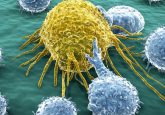AACR19 day 3 update: PARP inhibitors and much more

Today at our booth
The third day was one of the most exciting days of the AACR conference for the Oncology Central team as we eagerly waited to discover all the data from the plenary session. We have collated our highlights, let us know your thoughts in the comments below or on social media.
Remember you can find us at booth #4438, or follow our Twitter updates @OncologyCentral.
Video highlights
Today’s news
Rucaparib produces clinical response in certain pancreatic cancer patients
Maintenance therapy with the PARP inhibitor rucaparib (Rubraca®) has produced clinical responses amongst a subgroup of patients with advanced BRCA- or PALB2-mutated pancreatic cancer sensitive to platinum-based chemotherapy.
Esophageal cancers – combining virotherapy and radiotherapy shows early promise
Results from a Phase I clinical trial have indicated that a combination of virotherapy and radiotherapy results in a high response rate in esophageal cancer patients who may be unable to undergo more invasive treatments.
Surgery associated with increased survival in HER2+ Stage IV breast cancer patients
Results from a Phase lll clinical trial, assessing the effectiveness of a new targeted drug, taselisib, have demonstrated promising results against advanced breast cancer when combined with standard hormone therapy fulvestrant (Faslodex®).
Adults at high-risk of HIV less likely to be vaccinated against HPV
Adults at high risk of HIV infection were less likely than the general population to be vaccinated against HPV, which can cause anal and cervical cancer.
Worldwide study of prostate cancer shows incidence and mortality in decline
Prostate cancer incidence and mortality rates are decreasing or stabilizing in most parts of the world, with the United States recording the biggest drop in incidence.
Study points the finger at a common SNP for stroke risk in cancer survivors
Researchers have demonstrated that a common SNP is associated with an increased risk of stroke in childhood cancer survivors treated with cranial radiation therapy.
Best of social media #AACR19
I was proud to present my research at #AACR2019 on the use of Dimethyl Fumarate to protect white matter from damage following radiation therapy. This is all thanks to the support from @LombardiCancer @gutumorbiology and @georgetownPDA pic.twitter.com/nKIBnC2m0B
— Alex Taraboletti, PhD (@gulp_air) April 3, 2019
I feel privileged to have had the opportunity to attend to the annual #AACR19 ☺️???Time to get back to work! ?? pic.twitter.com/a9ZXUKhGfA
— Laura Torrente (@LauraTorrente4) April 4, 2019
Chris Babiarz is the last member of the Deming lab at #AACR19. He developed exciting data potentially identifying which patients with neuroendocrine tumors or small cell lung cancers are likely to benefit from immunotherapies. Really great work Chris!! @McArdleLab @UWCarbone pic.twitter.com/zPseI2p6lK
— Dustin Deming (@DocDustyD) April 4, 2019





